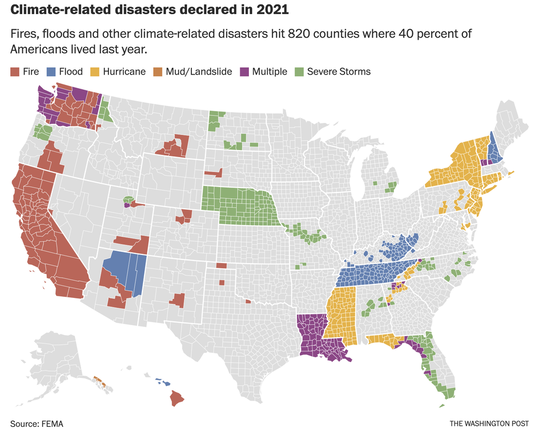by: Daniel Baker Have you or anyone you know ever had to relocate because of climate change or environmental reasons? Defining Climate Refugees The World Economic Forum defines climate refugees as “those forced to flee due to disasters and other weather events.” This past fall, world leaders left COP26 – the most consequential conference of nations regarding climate change since Paris 2015 – without a plan that matched the urgency this moment calls for. The urgency that a vast majority of scientists share. Climate change is an international problem, but localities can take steps to ensure the health and safety of their people today. Expanding the Definition of Climate Refugees Based on the standard definition, weather events that cause power outages and temporary displacement create climate refugees – events that don’t necessarily force people to leave their home country entirely. That could be a winter storm; the kind that ravaged huge swaths of Texas in 2021. That could be fires that engulf California, Colorado, and the vast lands out West. That could be a hurricane; be it a generational disaster like Katrina or a smaller storm. Beyond destruction, the quality, age, and design of infrastructure determine whether or not a building can withstand weather events. A new water system could fail if not designed to meet increased rainfall. A new HVAC system might not be able to withstand increasingly extreme heat waves. Future climate refugees could very well stem from poorly designed energy systems, not just major disasters. Powering the American Dream Electricity is as important to daily life in the U.S. as water and shelter. Since the start of COVID-19, working from home has become the norm for a majority of affluent Americans. Without power, there’s no Wi-Fi. Even for those who aren’t as lucky to conduct their work from the safety of their home, countless daily tasks require electricity. Ventilators, dialysis machines, and oxygen tanks require power to keep their patients alive. So when the power goes out – however “minor” the circumstances are – it’s a matter of life and death. The U.S. Energy Information Administration tracks outages for all 145 million U.S. customers. Most power outages occur without a major weather event. “In 2016, when major events are excluded, the average U.S. electricity customer was without power for 112 minutes and experienced one outage. When major events are included, the numbers increase by 138 minutes without power and 0.3 outage occurrences to a total of 250 minutes and 1.3 outages.” Immediate Action Required The outages are more than a distant threat. They’re affecting millions of Americans as you read this, reports The Washington Post. “More than 4 in 10 Americans live in a county that was struck by climate-related extreme weather last year, according to a new Washington Post analysis of federal disaster declarations, and more than 80 percent experienced a heat wave. In the country that has generated more greenhouse gases than any other nation in history, global warming is expanding its reach and exacting an escalating toll.” From coast to coast and everywhere in between, every region suffers from some kind of climate-fueled disaster. Each new event carries the potential to deprive people of life-saving power. Gemini Bolsters Resiliency Mitigating the negative impacts of power outages starts and ends with resiliency. We need resilient buildings that can withstand any climate change induced power outages – buildings that can generate and store clean energy. Of course energy efficiency and electrification are still important parts of the puzzle. A Gemini audit identifies the most cost-effective electrification changes available to commercial buildings. Using less while doing more helps reduce demand and energy costs. It’s the crucial first step toward electrification and a decarbonized building. But Gemini does a lot more than that. Our Clean Energy Hubs – the first being built in Hayward, California – incorporate solar panels so that our client can generate carbon-free power, which translates into carbon-free revenue to further serve the community. Two-way electric vehicle [EV] charging stations allow the building to store that clean energy for use during pique demand, or even a power outage. Instead of relying on the grid which could go out at any moment, a clean energy hub provides the necessary energy. A perfect fit for a community center, faith-based organization, or any business that wants to fully support the community. As climate change worsens, people will experience more power outages. They’ll need more resources to help them survive these turbulent times. A place to work when they can’t connect at home. A place to recharge, both literally and figuratively. Commercial buildings are typically “on” while residential buildings go dark. This dichotomy is the reason why Clean Energy Hubs should be a foundation for every community. Resiliency is Key for Underserved Communities Gemini’s goal is to transform underserved communities into resilient communities that can withstand whatever mother nature throws their way. They don’t get the help that more affluent communities receive. The federal government is trying to simplify the process of accessing available funds, as Politico recently reported, “but advocates from communities facing significantly higher environmental pollution and disinvestment, home to largely residents with low incomes or people of color, worry that federal agencies have not established strong enough oversight for how the dollars will flow.” Those advocates are also worried that the distribution will only perpetuate disparities and serve to benefit wealthier communities. That’s where Gemini steps in. We assess energy use and provide affordable solutions for energy efficiency, electrification, storage, and generation for the small commercial building sector. It’s the full package; everything a locality needs to not just survive power outages, but thrive. With fossil fuel prices on the rise and in constant flux, cheap, reliable, clean power has never been more important. About the author: Daniel Baker
Ten years of journalism and digital communications experience. In the previous ten years, Daniel has assisted in the first-ever launch of a new channel on a major radio network. By starting two podcasts from scratch, he helped launch the flagship chat show on a national digital TV network. Daniel also came up with pitches, wrote both short and long pieces, and edited them for a digital magazine. He managed marketing and communications for a successful outdoor recreation company that significantly relies on the environment for many years. It's safe to say that Daniel has accumulated a tremendous amount of experience operating under pressure and in a quick-paced setting. He is a skilled multi-tasker and project manager due to his experience producing national broadcasts and managing seven tasks at once! It would be difficult to find someone who is more adept at managing several tasks at once. His success has been largely attributed to his attention to detail. Each show is the result of hours of research. Sharing is caring. Share this blog with your network!
0 Comments
Leave a Reply. |
Archives
May 2024
CategoriesStart reading our blog today. Enlighten is good for your soul. Get updates, advice from energy experts and much more. You will not be disappointed. Find out everything you need to know about clean energy hubs, energy audits and much, much more. Grab a cup of coffee sit back and relax as you start reading our blog. Thak you for stopping by..
|
|
Partners
|
Company
|
|


 RSS Feed
RSS Feed